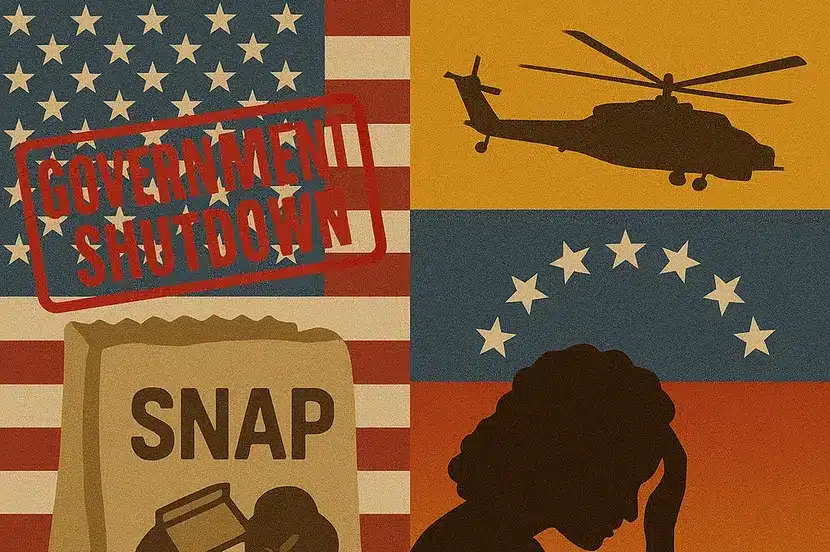The Shutdown Nobody’s Talking About
The House of Representatives has been out of session for six weeks. The Senate is out for the weekend. The president is at Mar-a-Lago. And 42 million Americans are about to lose access to SNAP—the Supplemental Nutrition Assistance Program, commonly known as food stamps—unless emergency action is taken immediately.
This is what a prolonged government shutdown looks like in 2025. Not just closed parks or delayed paychecks for federal workers. This is a crisis hitting low-income families, single parents, elderly Americans on fixed incomes, and children who rely on federal nutrition assistance to eat. The shutdown that started weeks ago is now reaching a breaking point where real people face real hunger.
A federal judge just granted a last-minute reprieve, ordering the Trump administration to tap emergency funds “as soon as possible” to keep the SNAP program from running completely dry. But the president’s response revealed a deeper problem: instead of immediate action, he’s stalling, questioning his authority, and suggesting that even with clarity, implementation will take time.
The Response That Reveals Everything
When a federal court ordered the administration to fund SNAP using emergency money, Trump’s response was telling. “Our government lawyers do not think we have legal authority to pay SNAP with certain monies we have available,” he wrote. “I have instructed our lawyers to ask the court to clarify how we can legally fund SNAP as soon as possible, even if we get immediate guidance, it will unfortunately be delayed while states get the money out.”
This was a rare moment: a president admitting he doesn’t have the authority to order something done. Except, as Democratic Congressman Adam Smith of Washington pointed out, this isn’t actually in question. Two federal judges just ordered him to do it. He did it before during the 2019 government shutdown. The authority exists. The question is whether he’ll use it.
The stalling is fundamentally dishonest, Smith argued. “It’s very, very clear that he can—federal judges just said not only that he can, but he must.” But the administration is treating a court order as a negotiation point, asking for clarification when the directive is already clear. Meanwhile, 42 million Americans wait to see if they’ll have money for groceries this month.
The Negotiations That Aren’t Happening
The shutdown has exposed a deeper dysfunction. Trump claims he’s “always going to meet” with Democrats. “All they have to do is open up the country, let them open up the country and we’ll meet,” he said after landing in Florida. But “always” doesn’t mean right now. Democrats have been ready to negotiate. The problem is that the president and House Speaker Mike Johnson have been unwilling to engage.
The House essentially vacated and deactivated on September 19th, Smith noted. “When we’re in a shutdown, this is where we need to be negotiating.” In past shutdowns, lawmakers stayed in session, worked through weekends, and found ways to mitigate the damage. This time, the House is absent, the Senate is part-time, and the president is posting about White House bathroom renovations while Americans face food insecurity.
There were signs of progress. The Wall Street Journal reported that Democrats and Republicans were making headway on a bipartisan deal to reopen the government. But Trump’s threat to eliminate the filibuster—which would allow Republicans to pass a budget with only Republican votes, bypassing Democratic input—may have disrupted those delicate negotiations. Senate Majority Leader John Thune quickly shot down the filibuster elimination, but the threat alone signaled that the administration prefers confrontation over compromise.
The Filibuster Fight And What It Means
The filibuster requires 60 votes to pass most legislation in the Senate, effectively forcing bipartisan cooperation. Trump is now pushing Republicans to eliminate it entirely, which would allow them to pass their reconciliation budget with only Republican votes—no Democratic input required.
But there’s a problem with this approach: the reconciliation process that Republicans used to pass their budget last March was designed to avoid the filibuster for budget-related items. But for other legislation, they still need Democratic votes. The filibuster exists to force negotiation. Trump’s position is essentially: don’t negotiate, just vote for our thing.
Smith, who has long supported filibuster elimination himself, noted the irony. “The filibuster was designed to force a negotiation. It’s pretty clear at this point that that’s not happening.” But the solution isn’t unilateral action—it’s actually negotiating. “The better option is to negotiate with Democrats, deal with the health care crisis, get the government back open and stop the pain that is happening right now for so many Americans.”
The Crisis That’s Getting Worse
While lawmakers point fingers, the shutdown’s impact is spreading. Staffing issues at air traffic control across the country are prompting more delays and ground stops at major airports. Long lines at security checkpoints are becoming routine. The situation “is likely to get worse with each passing day,” as critical services degrade without funding.
The health care crisis that Democrats warned about on October 1st is now fully underway. Johnson had said to talk to him on November 21st, but the crisis began before that date. Now the pain is ramping up, and the window for preventing widespread harm is closing.
At the same time, the administration’s attention appears divided. While posting about White House bathroom renovations seven times in one day, the president is also escalating a separate crisis that could have far more dangerous consequences: military action in Venezuela.
The Venezuela Escalation Nobody Saw Coming
While 42 million Americans face food insecurity, the Trump administration has been conducting what it calls “narco terrorist” strikes in Venezuela—almost daily, sometimes more than once per day. This represents a massive expansion of presidential power that Congress hasn’t approved and that raises serious legal questions.
Smith, as ranking member on the Armed Services Committee, received a briefing on the strikes. His assessment was blunt: “It’s pretty clearly illegal.” The administration is applying what amounts to “the death penalty for drug dealing” while acting as “judge, jury and executioner” with no due process.
The strikes target members of 24 different “narco terrorist” groups, but the administration won’t provide the list of organizations, explain who qualifies as “affiliated,” or clarify the legal basis for lethal strikes. This is happening in international waters currently, but the concern is that it’s a precursor to something larger.
The Military Buildup That Signals Bigger Plans
The US has sent or is sending an enormous amount of firepower to Venezuela. A guided missile destroyer. The most advanced US aircraft carrier, diverted from Europe. This isn’t just about blowing up boats carrying cocaine. This looks like preparation for something much more significant.
Smith sees three possibilities. First, Trump believes lethal strikes are an appropriate response to drug trafficking. But the targets are cocaine shipments, not fentanyl—which is actually the main killer in America. And traffickers will adapt: if boats get blown up in international waters, they’ll find other routes.
Second, the administration might be planning to move into sovereign territory of other nations—not just international waters. That’s a major escalation that would require congressional authorization. Third, and most concerning: the administration might be contemplating using military force to remove Venezuelan leader Nicolas Maduro from power.
“Based on the last 25 years, the United States of America should be out of the regime change business,” Smith said. “I thought we weren’t supposed to be engaging in foreign wars.” But the military buildup, combined with the lack of transparency and congressional briefing, suggests regime change is “absolutely in the playbook.”
The Transparency Crisis
The Venezuela situation reveals a deeper problem: the administration isn’t briefing Congress or the American people on the basis for its actions. The Intelligence Committees haven’t received briefings. The legal justifications are unclear. The targets are undefined. And the endgame is unspecified.
This is how military conflicts start: with incremental escalations that seem manageable, backed by vague justifications, without clear congressional oversight. The pattern is familiar from past interventions that didn’t end well.
Meanwhile, back home, the administration is stalling on a court order to feed 42 million Americans while posting about bathroom renovations. The contrast is stark: urgent action on potential foreign military intervention, but hesitation and legal questions when it comes to domestic food assistance.
What Happens Next
The shutdown crisis has multiple moving parts. A federal court has ordered SNAP funding, but the administration is stalling. Bipartisan negotiations were making progress, but filibuster threats may have disrupted them. The House has been absent for six weeks. Critical services are degrading. And the pain is spreading.
At the same time, military escalation in Venezuela continues without clear legal basis or congressional authorization. The administration appears to be moving toward actions that could require regime change or intervention in sovereign territory—exactly the kind of foreign entanglements that should require robust debate and approval.
The common thread is a pattern of avoiding negotiation, rejecting oversight, and acting unilaterally. Whether it’s refusing to negotiate with Democrats to end the shutdown, stalling on court orders to feed Americans, or escalating military action without congressional authorization, the approach is the same: bypass process, avoid accountability, and act alone.
Key Takeaway
The government shutdown has reached a crisis point: 42 million Americans face losing SNAP benefits while a federal judge orders emergency relief, but the administration is stalling. Meanwhile, Trump escalates military strikes in Venezuela daily without clear legal basis, congressional authorization, or transparency about endgame. The pattern is clear: rejection of negotiation, avoidance of oversight, and unilateral action—whether on domestic food assistance or foreign military intervention. The pain is real and spreading, while the administration’s attention is divided between bathroom renovations and potential regime change.




